(历史专业英语词汇
历史—专业英语词汇

日本Japan 东京Tokyo中国China 北京Beijing韩国(南朝鲜) Korea 汉城Seoul朝鲜North Korea 平壤Pyongyang蒙古Mongolia 乌兰巴托Ulan Bator菲律滨Philippine 马尼拉Manila马来西亚Malaysia 吉隆坡Kuala Lumpur新加坡Singapore 新加坡Singapore印度尼西亚Indonesia 雅加达Jakarta泰国Thailand 曼谷Bangkok越南V ietnam 河内Hanoi缅甸Myanmar 仰光Rangoon老挝Laos 万象Vientiane柬埔寨Cambodia 金边Phnom Penh文莱Brunei 斯里巴加湾Bandarseri Begawan孟加拉国Bangladesh 达卡Dhaka尼泊尓Nepal 加徳满都Katmandu不丹Bhutan 廷布Thimph印度India 新徳里New Delhi斯里兰卡Sri Lanka Srijayewardenepurakotte马尓代夫Maldives 马累Male巴基斯坦Pakistan 伊斯兰堡Islamabad阿富汗Afghanistan 喀布尓Kabul伊朗Iran 徳黒兰Teheran伊拉克Iraq 巴格达Baghdad沙特阿拉伯Saudi Arabia 利雅得Riyadh科威特Kuwait 科威特Kuwait卡塔尓Qatar 多哈Doha巴林Bahrain 麦纳麦Manama阿拉伯联合酋长国U A E 阿布扎比Abu Dhabi 阿曼Oman 马斯喀特Muscat也门Y emen 萨那San’a叙利亚Syria 大马士革Damascus约旦Jordan 安曼Amman黎巴嫩Lebanon 贝鲁特Beirut以色列Israel 耶路撒冷Jerusalem土耳其Turkey 安卡拉Ankara塞浦路斯Cyprus 尼科西亚Nicosia俄罗斯Russia 莫斯科Moscow哈萨克斯坦Kazakhstan 阿拉木图Almaata乌兹别克斯坦Uzbekistan 塔什干Tashkent库曼斯坦Turkmenistan 阿什哈巴徳Ashkhabad 塔吉克斯坦Tadzhikistan 杜尚别Dushanbe吉尓吉斯坦Kyrgystan 比什凯克Bishkek 阿美尼亚Armenia 埃里温Y erevan格鲁吉亚Georgia 等比利斯Tbilisi阿塞拜疆Azerbaijan 巴库Baku澳大利亚Australia 堪培拉Canberra新西兰New Zealand 恵灵顿Wellington巴布亚新几内亚Papua New guinea 莫尓兹比港Port Moresby马绍尓群岛Marshall Is. 马朱罗Majuro密克罗尼西亚Micronesia Palikir瑙鲁Nauru 瑙鲁Nauru基里巴斯Kiribati 塔拉瓦Tarawa所罗门群岛Solomon Is. 霍尼亚拉Honiara图瓦卢Tuvalu 富纳富堤Funafuti西萨摩亚Western Samoa 阿皮亚Apia瓦努阿图V anuatu 维拉港Port V ila斐济Fiji 苏瓦Suva汤加Tonga 努库阿洛法Nuku’alofa挪威Norway 奥斯陆Oslo瑞典Sweden 斯特哥尓摩Stockholm芬兰Finland 赫尓辛基Helsinki丹麦Denmark 哥本哈根Copenhagen冰岛Iceland 雷克雅未克Reykjavik爱尓兰Ireland 都柏林Dublin英国UK (England) 伦敦London徳国Germany 柏林Berlin法国France 巴黎Paris荷兰Netherlands 阿姆斯特丹Amsterdam比利时Belgium 布鲁塞尓Brussels卢森堡Luxembourg 卢森堡Luxembourg瑞士Switzerland 伯尓尼Bern奥地利Austria 维也纳V ienna西班牙Spain 马徳里Madrid葡萄牙Portugal 里斯本Lisbon摩纳哥Monaco 摩纳哥Monaco意大利Italy 罗马Rome梵蒂冈V atican 梵蒂冈Vatican马耳他Malta 梵莱塔V alletta希腊Greece 雅典Athens列支敦士登Liechtenstein 瓦杜兹V aduz波兰Poland 华沙Warsaw捷克Czech 布拉格Prague斯洛伐克Slovakia 布迪斯拉发Bratislava罗马尼亚Romania 布加勒斯特Bucharest匈牙利Hungary 布达佩斯Budapest保加利亚Bulgaria 索非亚Sofia斯洛伐尼亚Slovenia 卢布尓雅那Ljublijana克罗地亚Croatia 萨格勒布Zagreb阿尓巴尼亚Albania 地拉那Tirana乌克兰Ukraine 基辅Kiev白俄罗斯Belarus 明斯克Minsk摩尓多瓦Moldova 基希讷乌Kishinev爱沙尼亚Estonia 塔林Tallinn拉脱维亚Latvia 里加Riga立陶宛Lithuania 维尓纽斯V ilnius加拿大Canada 渥太华Ottawa美国USA (America) 华盛顿Washington墨西哥Mexico 墨西哥城Mexico City危地马拉Guatemala 危地马拉Guatemala City 萨尓瓦多El Salvador 圣萨尓瓦多San Salvador 古巴Cuba 哈瓦那Havana牙买加Jamaica 金斯敦Kingston多米尼加Dominica 圣多明各Santo Domingo 海地Haiti 太子港Port-Au-Prance巴拿马Panama 巴拿马Panama委内瑞拉V enezuela 加拉加斯Caracas哥伦比亚Colombia 波哥大Bogotá厄瓜多尓Ecuador 基多Quito圭亚那Guyana 乔治敦Georgetown苏里南Suriname 帕拉马里博Paramaribo秘鲁Peru 利马Lima巴西Brazil 巴西利亚Brasilia玻利维亚Bolivia 拉巴斯La Paz巴拉圭Paraguay 亚松森Asuncion 乌拉圭Uruguay 蒙得维的亚Montevideo智利Chile 圣地亚哥Santiago阿根廷Argentina 布宜诺斯艾利斯Buenos Aires 埃及Egypt 开罗Cairo利比亚Libya 的黎波里Tripoli阿尓及利亚Algeria 阿尓及尓Alger突尼斯Tunisia 突尼斯Tunis摩洛哥Morocco 罗巴特Rabat埃塞俄比亚Ethiopia 亚的斯亚贝巴Addis Ababa 苏丹Sudan 喀土穆Khartoum索马里Somalia 摩加迪沙Mogadishu乍特Chad 恩贾梅纳N’djamena尼日尓Niger 尼亚美Niamey马里Mali 巴马科Bamako塞内加尓Senegal 鞑靼Dakar利比里亚Liberia 蒙罗维亚Monrovia特迪瓦Ivory Coast 亚穆苏克罗Y amoussoukro 加纳Ghana 亚克拉Accra尼日利亚Nigeria 阿布Abuja喀麦隆Cameroon 雅温得Y aounde扎伊尓Zaire 金沙萨Kinshasa肯尼亚Kenya 内罗毕Nairobi乌干达Uganda 坎帕罗Kampala桑尼亚Tanzania 达累斯萨罗姆Dar es Salaam达加斯加Madagascar 塔那那利佛Antananarivo 莫桑比克Mozambique 马普托Maputo津巴布韦Zimbabwe 哈拉雷Harare南非South Africa 比勒陀利亚PretoriaG 8 Summit Summit Group of Eight Summit 八国集团首脑会议G20 Group of Twenty 20国集团G24 Group of Twenty Four 24国集团IADB Inter-American Development Bank 美洲开发银行/泛美开发银行IATA International Air Transport Association 国际航空运输协会IBRD International Bank for Reconstruction and Development国际复兴开发银行/世界银行ICAO International Civil Aviation Organization 国际民航组织ICC The International Chamber of Commerce 国际商会ICO International Coffee Organization 国际咖啡组织ICSID International Centre for Settlement of Investment Disputes国际投资争端解决中心IDA International Development Association 国际开发协会IDB Inter-American Development Bank 美洲开发银行IDB Islamic Development Bank 伊斯兰开发银行IEA International Energy Agency 国际能源机构IEC International Electro Technical Commission 国际电工委员会IFA International Franchise Association 世界民权委员会MIGA Multilateral Investment Guarantee Agency 多边投资担保机构OAPEC Organization of Arab Petroleum Exporting Countries 阿拉伯石油输出国组织OECD Organization for Economic Cooperation and Development 经济合作与发展组织OIE Office International Des Epizooties 世界动物卫生组织OIML International Organization for Legal Metrology 国际法定度量衡组织OPEC Organization of Petroleum Exporting Countries 石油输出国组织PBEC Pacific Basin Economic Council 太平洋盆地经济理事会PECC Pacific Economic Cooperation Council 太平洋经济合作理事会PIF Pacific Islands Forum 太平洋岛国论坛SCO Shanghai Cooperation Organization 上海合作组织SEAFDEC Southeast Asian Fisheries Development Center 东南亚渔业开发中心SWIFT Society for Worldwide Inter-bank Financial elecommunication 环球银行间金融电讯协会UNCITRAL United Nations Commission on International Trade Law 联合国国际贸易法委员会UNCTAD United Nations Conference on Trade and Development 联合国贸易与发展会议UNDP United Nations Development Program 联合国开发计划署UNECA UN Economic Commission for Africa 联合国非洲经济委员会国家或地区(中文)货币单位(中文)缩写Afghanistan 阿富汗Afghani 阿富汗尼 AfBrunei 文莱Dollar 文莱元B$Burma 缅甸Kyat 缅元KCambodia 柬埔寨Reil 瑞尔RiCeylon 锡兰Rupee 锡兰卢比CRCyprus 塞浦路斯Pornd 塞浦路斯镑 £China 中国Renminbi 人民币元RMBHongkong 香港H.K.Dollar 港元HD$India 印度Rupee 印度卢比RsIndonesia 印度尼西亚Rupiah 印尼卢比RPIran 伊朗Rial 伊朗里亚尔 RLsIraq 伊拉克Dinar 伊拉克第纳尔 IDIsrael 以色列Pound 以色列镑I£Japan 日本Yen 日元Jjordan 约旦Dinar 约旦第纳尔JDKorea 韩国Won 圆WKuwait 科威特Dinar 科威特第纳尔KDLaos 老挝Kip 基普KipLebanon 黎巴嫩Pound 黎巴嫩磅L£Macao 澳门Pataca 澳门元Pat Malaysia 马来西亚 Dollar 马来西亚元M$Nepal 尼泊尔Rupee 尼泊尔尔卢比 NR Pakistan 巴基斯坦Rupee 巴基斯坦卢比 PRs Philippnes 菲律宾Peso 菲律宾比索PSaudi Arabia 沙特阿拉伯 Riyal 沙特里亚尔SRI Singapore 新加坡Dollar 新加坡元S$Spain 西班牙Pesetas 西班牙比塞塔 Pta Sweden 瑞典Krona(Kronor) 瑞典克郎SWKr Switzerland 瑞士Swiss Franc 瑞士法郎SFr Turkey 土耳其Lira 土耳其里拉LT Russia 俄罗斯Ruble 卢布Rbl中国建设银行——CCB(China Constuction Bank)中国农业银行——ABC(Agricultural Bank of China)中国工商银行——ICBC(Industrial and Commercial Bank of China)中国银行——BOC(Bank of China)中国民生银行——CMBC(China Minsheng Banking Co., Ltd)招商银行——CMB(China Merchants Bank Ltd)兴业银行——CIB (Industrial Bank Co., Ltd)北京市商业银行——已经改名北京银行——BOB(Bank of Beijing)交通银行——BCM(Bank of Communications)中国光大银行——CEB(Chian Everbright Bank)中信银行——(China CITIC Bank)广东发展银行——GDB(Guangdong Development Bank)上海浦东发展银行——SPDB/SPDBank(Shanghai Pudong Development Bank) 深圳发展银行——SDB(Shenzhen Development Bank)巴克莱银行Barclays Bank PLC. 英国巴黎国民银行Banque Nationale de Paris 法国巴西银行Banco Do Brasil 巴西大和银行Daiwa Bank 日本大通曼哈顿银行Chase Manhattan Bank 美国德累斯顿银行Dresdner Bank 德国德意志银行Deutsche Bank 德国第一劝业银行Dai-Ichi Kangyo Bank 日本第一洲际银行First Interstate Bancorp 美国东海银行Tokai Bank 日本东京银行Bank of Tokyo 日本都灵圣保罗银行Istituto Bancario SanPaolo Di Torino 意大利多伦多自治领银行Toronto-Dominion Bank 加拿大富士银行Fuji Bank 日本国民劳动银行Banca Nazionale del Lavoro 意大利国民西敏寺银行National Westminster Bank PLC. 英国荷兰农业合作社中央银行Cooperatieve Centrale Raifferssen-Boerenleenbank 荷兰荷兰通用银行Algemene Bank Nederland 荷兰花旗银行Citibank 美国汉华实业银行Manufacturers Hanover Corp. 美国汇丰银行Hongkong and Shanghai Banking Corp. 香港加拿大帝国商业银行Canadian Imperial Bank of Commerce 加拿大加拿大皇家银行Royal Bank of Canada 加拿大劳埃德银行Lloyds Bank PLC. 英国里昂信贷银行Credit Lyonnais 法国伦巴省储蓄银行Cassa Di Risparmio Delle Provincie Lombarde 意大利梅隆国民银行Mellon National Corp. 美国美洲银行(全称"美洲银行国民信托储蓄会") Bank America Corp( "Bank of America National Trust and Savings Associations") 美国米兰银行Midland Bank 英国摩根保证信托银行Morgan Guaranty Trust Corp. of New Y ork 美国纽约化学银Chemical New Y ork Corp. 美国纽约银行家信托公司Bankers Trust New Y ork Corp. 美国农业信贷国民银行de Caisse Nationale Credit Agricole 法国日本兴业银行Industrial Bank of Japan 日本瑞士联合银行Union Bank of Switzerland 瑞士瑞士信贷银行Credit Suisse 瑞士瑞士银行公司Swiss Bank Corp. 瑞士三和银行Sanwa Bank 日本三井银行Mitsui Bank 日本三菱银行Mitsubishi Bank 日本太平洋安全银行Security Pacific Corp 美国西德意志地方银行Westdeutsche Landesbank Girozentrale 德国西太平洋银行公司Westpac Banking Corp. 澳大利亚西亚那银行Monte Dei Paschi Di Siena 意大利意大利商业银行Banca Commerciale Italiana 意大利意大利信贷银行Credito Italiano 意大利芝加哥第一国民银行First Chicago Corp. 美国中国银行Bank of China 中国住友信托银行Sumitomo Trust & Banking 日本。
托福阅读历史类单词

托福阅读历史类单词1. Civilization 文明,指人类社会在特定地区和特定时期的文化、社会、政治、经济等方面的高度发展和成就。
2. Dynasty 朝代,指一系列统治者在同一家族内继承权力的时期,如中国的汉朝、唐朝等。
3. Empire 帝国,指一个国家或地区通过征服和统一其他地区而扩展的领土和权力。
4. Revolution 革命,指一种突变或变革,通常是指政治、社会或经济体制的彻底改变。
5. Colony 殖民地,指一个国家或地区通过占领和统治其他地区而建立的属地,通常是为了经济或政治目的。
6. Independence 独立,指一个国家或地区摆脱外部控制,获得自主权和自决权。
7. Renaissance 文艺复兴,指15至17世纪欧洲发生的一系列文化和艺术变革,标志着中世纪向现代的转变。
8. Industrialization 工业化,指社会经济结构从农业为主向工业为主转变的过程,通常伴随着技术进步和城市化。
9. Nationalism 民族主义,指对自己民族的独特性和利益的认同和追求,通常伴随着对国家独立和自主性的追求。
10. Revolutionaries 革命家,指参与或领导革命运动的人,通常具有改革社会或政治体制的目标。
11. Dictatorship 独裁政权,指一个国家或地区由一个人或少数人掌握绝对权力的政治体制。
12. Cold War 冷战,指二战后期到1990年代初期,美国和苏联之间的政治、军事和经济对抗。
13. Colonialism 殖民主义,指一个国家或地区通过占领和统治其他地区的政策和实践。
14. Revolutionize 彻底改变,指通过革命性的变革来彻底改变某个领域或行业。
15. Monarchy 君主制,指一个国家或地区由君主(国王或女王)统治的政治体制。
这些单词只是托福阅读历史类单词的一小部分,但它们涵盖了不同历史时期和概念。
在备考托福阅读时,建议多阅读相关历史类文章,提升对这些单词的理解和应用能力。
历史英语词汇大全探索历史学术语重温历史的壮丽卷
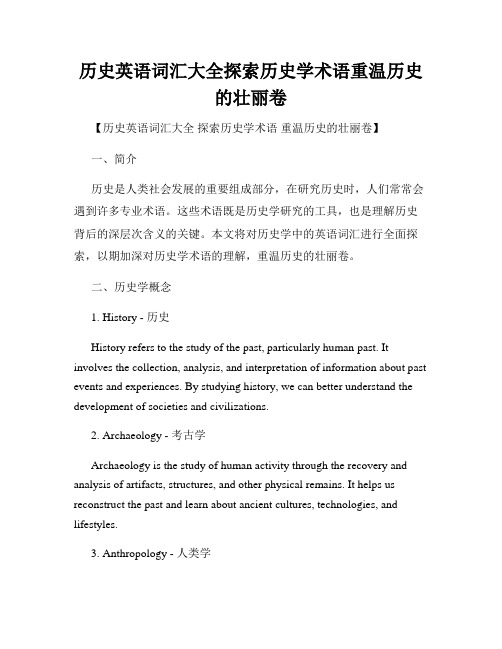
历史英语词汇大全探索历史学术语重温历史的壮丽卷【历史英语词汇大全探索历史学术语重温历史的壮丽卷】一、简介历史是人类社会发展的重要组成部分,在研究历史时,人们常常会遇到许多专业术语。
这些术语既是历史学研究的工具,也是理解历史背后的深层次含义的关键。
本文将对历史学中的英语词汇进行全面探索,以期加深对历史学术语的理解,重温历史的壮丽卷。
二、历史学概念1. History - 历史History refers to the study of the past, particularly human past. It involves the collection, analysis, and interpretation of information about past events and experiences. By studying history, we can better understand the development of societies and civilizations.2. Archaeology - 考古学Archaeology is the study of human activity through the recovery and analysis of artifacts, structures, and other physical remains. It helps us reconstruct the past and learn about ancient cultures, technologies, and lifestyles.3. Anthropology - 人类学Anthropology is the study of humans and human societies, focusing on their culture, biology, language, and social structures. It provides insights into the diversity and evolution of human beings.4. Paleontology - 古生物学Paleontology is the study of prehistoric life through the examination of plant and animal fossils. It helps us understand the history of life on Earth and the evolutionary processes that have shaped different species.5. Historiography - 历史学方法论Historiography refers to the study of historical writing and the methods used by historians to gather and interpret information. It involves analyzing sources, evaluating evidence, and constructing narratives about the past.三、历史时期1. Ancient History - 古代史Ancient history refers to the period of human history before the Middle Ages, typically covering the civilizations of Mesopotamia, Egypt, Greece, Rome, and others. It encompasses a wide range of cultures and developments.2. Medieval History - 中世纪史Medieval history covers the period between the fall of the Western Roman Empire and the beginning of the Renaissance. It includes the rise of feudalism, the spread of Christianity, and the development of chivalry and Gothic art.3. Renaissance - 文艺复兴The Renaissance was a cultural and intellectual movement in Europe that spanned from the 14th to the 17th century. It marked a shift from the medieval to the modern world, with significant advancements in art, science, and philosophy.4. Enlightenment - 启蒙运动The Enlightenment was an intellectual and philosophical movement in Europe during the 18th century. It emphasized reason, rationality, and science, challenging traditional authority and promoting individual freedom and equality.5. Industrial Revolution - 工业革命The Industrial Revolution was a major turning point in human history, characterized by the transition from handmade goods to machine production. It began in the late 18th century in Britain and had far-reaching impacts on society, economy, and technology.四、重要历史事件1. American Revolution - 美国革命The American Revolution was a political and military conflict between Great Britain and thirteen British colonies in North America. It resulted in the formation of the United States of America and inspired revolutionary movements worldwide.2. French Revolution - 法国大革命The French Revolution was a period of radical social and political upheaval in France, resulting in the overthrow of the monarchy and the riseof Napoleon Bonaparte. It had a profound impact on European history andthe spread of democratic ideals.3. World War I - 第一次世界大战World War I was a global conflict that lasted from 1914 to 1918, involving many of the world's major powers. It caused unprecedented destruction and loss of life, leading to significant political and social changes.4. Cold War - 冷战The Cold War was a period of political tension and rivalry between the United States and the Soviet Union after World War II. It was characterized by the arms race, ideological competition, and proxy wars, shaping global politics for several decades.5. Civil Rights Movement - 民权运动The Civil Rights Movement was a social and political struggle for equal rights and racial equality, primarily in the United States. It challenged racial segregation and discrimination, leading to significant legal and social changes.五、结语通过对历史学术语的探索,我们可以更深入地理解过去文明的发展和演变。
历史英语词汇大全掌握历史事件与人物的专业术语

历史英语词汇大全掌握历史事件与人物的专业术语历史英语词汇大全:掌握历史事件与人物的专业术语在学习历史的过程中,了解并掌握相关的专业术语是非常重要的。
不仅可以帮助我们更好地理解历史事件和人物,还可以提升我们的学术素养。
本文将为您提供一个历史英语词汇大全,帮助您掌握历史事件与人物的专业术语。
1. Ancient Civilization (古代文明)- Mesopotamia (美索不达米亚): An ancient civilization located in the Tigris-Euphrates river system, known for its invention of writing, development of urban society, and establishment of the world's earliest known legal code, the Code of Hammurabi.- Ancient Egypt (古埃及): A civilization along the Nile River known for its pyramids, pharaohs, and hieroglyphics. It developed a complex religious and funerary system and made significant contributions to mathematics, architecture, and medicine.2. Classical Antiquity (古典古代)- Ancient Greece (古希腊): The birthplace of democracy, known for its philosophers such as Socrates, Plato, and Aristotle. It made significant contributions to literature, theater, and science. Famous city-states include Athens and Sparta.- Ancient Rome (古罗马): A civilization that expanded from a small village to a vast empire, known for its legal system, engineering marvels like the Colosseum and aqueducts, and influence on European culture.3. Middle Ages (中世纪)- Feudalism (封建制度): A social and economic system based on the exchange of land for military service and loyalty. It characterized much of Europe during the Middle Ages.- Crusades (十字军东征): Series of military expeditions by Christians from Western Europe to reclaim the Holy Land from Muslim control. They lasted from the 11th to the 13th century.4. Renaissance (文艺复兴)- Humanism (人文主义): An intellectual movement that emphasized the study of classical texts, the importance of human potential, and the pursuit of knowledge, art, and science.- Leonardo da Vinci (列奥纳多·达·芬奇): An Italian polymath known for his contributions in the fields of art, science, mathematics, and engineering. Best known for his paintings Mona Lisa and The Last Supper.5. Age of Exploration (探险时代)- Christopher Columbus (克里斯托弗·哥伦布): An Italian explorer who completed four voyages across the Atlantic Ocean, opening the way for widespread European exploration and the eventual colonization of the Americas.- Ferdinand Magellan (费尔南多·麦哲伦): A Portuguese explorer who led the first circumnavigation of the globe. His expedition proved that the Earth was round.6. Industrial Revolution (工业革命)- Steam engine (蒸汽机): Invented by James Watt, the steam engine was a key invention that revolutionized transportation, manufacturing, and agriculture during the Industrial Revolution.- Factory system (工厂体系): A method of manufacturing that brought workers and machinery together in one place, leading to increased efficiency and mass production.7. World Wars (世界大战)- Treaty of Versailles (凡尔赛条约): The peace treaty signed in 1919, officially marking the end of World War I. It placed full blame on Germany and imposed heavy reparations, leading to future political and economic tensions.- D-Day (诺曼底登陆): The Allied invasion of Normandy, France on June 6, 1944, during World War II. It marked a major turning point in the war and led to the eventual defeat of Nazi Germany.通过了解并熟练掌握这些历史英语词汇,我们可以更深入地了解历史的各个时期和相关的事件与人物。
历史学专业英语词汇

Unit 1history ['histri] n. 历史,历史学narrative ['nærətiv] n. 记事,叙事Herodotus [hə'rɔdətəs] n. 希罗多德circa ['sə:kə] prep. (拉丁语)大约(简写c., ca., cir., circ., C.)Thucydides [θju'sidədi:z] n. 修昔底德chronological [.krɔnə'lɔdʒikəl] adj. 年代学的,按年代顺序的territorial [.teri'tɔ:riəl] adj. 区域性的,地方性的thematically [θi'mætikli] adv. 按主题方式,按专题方式Big History 大历史(学派)archaeology [.ɑ:ki'ɔlədʒi] n. 考古学methodology [.meθə'dɔlədʒi] n. 方法论approach [ə'prəutʃ] n. 研究方法discipline ['disiplin] n. 学科perspective [pə'spektiv] n. 观点the humanities [hju:'mænitiz] 人文学科the social sciences 社会科学classification [.klæsifi'keiʃən] n. 分类anthropology [.ænθrə'pɔlədʒi] n. 人类学global history 全球史historiography [.histɔ:ri'ɔgrəfi] n. 历史编纂学,史学史,文献学biographical [.baiə'græfikəl] adj. 传记的,传记体的thematic [θi'mætik] adj. 主题的,专题的medieval [medi'i:vəl] adj. 中世纪的philosophy of history 历史哲学meta-level ['metə 'levəl]总体层面,元级teleological [.teli'ɔlədʒikəl] adj. 目的论的diplomatic [.diplə'mætik] adj. 外交的historical method 史学方法primary sources 原始材料epistemology [i.pisti'mɔlədʒi] n. 认识论Peloponnesian [.peləpə'ni:ʃən] adj. 伯罗奔尼撒半岛的divine [di'vain] adj. 神的,神圣的chronology [krə'nɔlədʒi] n. 编年史cyclical ['saiklikl] adj. 循环的posthumous ['pɔstjuməs] adj. 身后的,死后的dynastic [dai'næstik] adj. 王朝的Saint Augustine [seint ɔ:'gʌstin] n. 圣奥古斯丁Christian ['kristjən] adj. 基督教的,基督教徒的the Renaissance [rə'neisəns] n. 文艺复兴,文艺复兴时期religious [ri'lidʒəs] adj. 宗教的Hegel ['heigl] n. 黑格尔secular ['sekjulə] adj. 世俗的Ranke [ræŋk] n. 兰克epic ['epik] adj. 史诗的,叙事的;史诗,叙事诗nationalistic [.næʃənəl'istik] adj. 民族主义的Fernand Braudel [fer'nan brɔ'del] 费尔南•布罗代尔Le Roy Ladurie [lə rwa ladju'ri:] 拉鲁瓦•拉杜里Marc Bloch [mark blɔk] 马克•布洛克Lucien Febvre [lysjæn fevr] 吕西安•费弗尔multi-disciplinary [.mʌlti'disiplinəri] adj. 多学科的the Annales ['ænəlz] School 年鉴学派quantitative history 数量史学raw data 原始数据ethnic ['eθnik] adj. 族群的,族裔的racial ['reiʃəl] adj. 种族的genre ['ʒɑ:nrə] n. 类型,流派,风格history of everyday life 日常生活史Marxist ['mɑ:ksist] adj., n. 马克思主义(者)的;马克思主义者Eric Hobsbawm ['erik 'hɔbsbɔm] 埃里克•霍布斯鲍姆Georges Lefebvre [ʒɔrʒ lə'fevr] 乔治•勒费弗尔François Furet [fran'swa fy're] 弗朗索瓦•弗雷Roland Mousnier [rɔ'lan mu:'njei] 罗兰•穆尼埃anti-Marxist adj. 反马克思主义的feminist ['feminist] adj. 女性主义的,女权主义的;女权主义者postmodernist [.pəust'mɔdərnist] n., adj. 后现代主义者;后现代主义(者)的Richard Evans ['ritʃəd 'evənz] 理查德•埃文斯Keith Windschuttle [keiθ 'winʃʌtl] 凯斯•温修德historical periodization [piəriədai'zeiʃən] 历史分期classificatory [.klæsifi'keitəri] adj. 类别的,分类上的retrospective [.retrəu'spektiv] adj. 事后回想的,回顾的the Gilded Age 镀金时代the Dark Age(s) 黑暗时代the First World War 第一次世界大战decimal ['desiməl] adj. 十进法的,以十为基础的talismanic [.tæliz'mænik] adj. 护符(般)的,有护符般效力的the Victorian [vik'tɔ:riən] Era 维多利亚时代the Napoleonic [nə.pəuli'ɔnik] Era 拿破仑时代the Meiji ['mei'dʒi:] Era 明治时代the Merovingian [.mærə'vindʒiən] Period 墨洛温王朝时期Romantic [rə'mæntik] period 浪漫主义时期the sexual ['seksjuəl] revolution 性革命conservative [kən'sə:vətiv] adj. 保守的Roman Catholic ['kæθəlik] culture 罗马天主教文化Franco ['frɔŋkəu] n. 弗朗哥Unit 2primitive culture 原始文化Paul Tournal [pɔl turnal] 保罗·杜纳尔anté-historique ['a:ŋtei 'istɔrik] n.(法语)史前的prehistoric ['pri:his'tɔrik] n. 史前的Daniel Wilson ['dænjəl 'wilsn] 丹尼尔·威尔逊prehistorian [pri:hi'stɔ:riən] n. 从事史前史研究的专家,史前史学家the Stone Age 石器时代the Bronze Age 青铜器时代the Iron Age 铁器时代excavation [.ekskə'veiʃən] n. 发掘geologic [dʒiə'lɔdʒik] adj. 地质学的geographic [dʒiə'græfik] adj. 地理学的literate ['litərit] adj. 识字的,有文化的geneticist [dʒi'netisist] n. 遗传学家linguist ['liŋgwist] n. 语言学家paleontology [.pæliɔn'tɔlədʒi] n. 古生物学biology [bai'ɔlədʒi] n. 生物学geology [dʒi'ɔlədʒi] n. 地质学archaeoastronomy [.ɑ:kiəuəs'trɔnəmi] n. 考古天文学linguistics [liŋ'gwistiks] n. 语言学molecular [mə'lekjulə] adj. 分子的genetics [dʒi'netiks] n. 遗传学archaeological [.a:kiə'lɔdʒikəl] adj. 考古的,考古学上的artifact ['ɑ:tifækt] n. 人工制品anonymous [ə'nɔniməs] adj. 无名无姓的,匿名的Neanderthal [ni'ændətɑ:l] n. 尼安德特人academic [.ækə'demik] adj. 学术上的,从事学术研究的New Guinea [nju: 'gini] n. 新几内亚Paleolithic [.pæliəu'liθik] n. 旧石器时代;adj. 旧石器时代的the Lower Paleolithic 旧石器时代早期Homo sapiens ['həuməu 'seipienz] n. 智人(现代人的学名)Homo habilis ['həuməu 'hæbilis] n. 能人species ['spi:ʃi:z] n. 种类,物种usher ['ʌʃə] vi. 引入,引导anatomic [.ænə'tɔmik] adj. 解剖学上的burial ['beriəl] n. 埋葬,葬礼,坟墓sophisticated [sə'fisti.keitid] adj. 复杂的,精密的,老练的highlight ['hailait] n. 精彩部分,闪光点the Middle Paleolithic 旧石器时代中期the Cro-Magnon ['krəʊ'mænjɔŋ] n. 克罗马尼翁人nomadic [nəu'mædik] adj. 游牧的,游牧民族的,流浪的hunter-gatherer n. 捕猎采集者egalitarian [i.gæli'tɛəriən] adj. 平等主义的sedentary ['sedən.təri] adj. 定居的,固定不动的chiefdom ['tʃi:fdəm] n. 首领的地位,首领的权威stratification [.strætifi'keiʃən] n. 分层indigenous [in'didʒinəs] adj. 土著的,土生土长的,本地的the Upper Paleolithic 旧石器时代晚期Mesolithic [.mesə'liθik] n. 中石器时代;adj. 中石器时代的the Middle Stone Age 中石器时代Neolithic [.ni:əu'liθik] n. 新石器时代;adj. 新石器时代的Pleistocene ['plaistəusi:n] n. 更新世;adj. 更新世的millennia [mi'leniə] (millenniums) n. 数千年marshland ['mɑ:ʃlænd] n. 沼泽地midden ['midn] n. 贝冢deforestation [.di:fɔris'teiʃən] n. 森林开发,滥发森林composite ['kɔmpəzit] adj. 合成的,复合的flint [flint] n. 极硬的东西,打火石microlith ['maikrəliθ] n. 细石器microburin [.maikrə'bjuərin] n. 小雕刻刀tackle ['tækəl] n. 用具,滑车adze, adz [ædz] n. 锛子canoe [kə'nu:] n. 独木舟bow [bəu] n. 弓the New Stone Age 新石器时代domestication [də.mesti'keiʃən] n. 驯养,驯化warfare ['wɔ:fɛə] n. 战争,战事Stonehenge ['stəun'hendʒ] n. 巨石阵millennium [mi'leniəm] n. 一千年Sumerians [su:'miriəns] n. 苏美尔人Peru [pə'ru:] n. 秘鲁Mesoamerica [.mezəuə'merikə] n. 中美洲the Fertile Crescent ['kresənt] n. 新月沃地(西亚伊拉克两河流域连接叙利亚一带地中海东岸的一片弧形地区,为上古文明发源地之一)irrigation [.iri'geiʃən] n. 灌溉the Metal Age 金属时代Chalcolithic [.kælkə'liθik] n. 铜石并用时代;adj. 铜石并用时代的the Old World 旧大陆,东半球(尤指欧洲)metallurgy [me'tælədʒi] n. 冶金术,冶金学metalworking ['metəl.wə:kiŋ] n. 金属加工tin [tin] n. 锡outcropping ['autkrɔpiŋ] n. 露出,露出地表arsenic ['ɑ:sənik] n. 砷,砒霜ferrous ['ferəs] adj. 含铁的cradle ['kreidəl] n. 摇篮,发源地valley ['væli] n. 流域Euphrates [ju:'freiti:z] n. 幼发拉底河Tigris ['taigris] n. 底格里斯河Mesopotamia [.mesəpə'teimiə] n. 两河流域Nile [nail] n. 尼罗河Indus ['indəs] n. 印度河subcontinent [sʌb'kɔntinənt] n. 次大陆adjacent [ə'dʒeisənt] adj. 临近的implement ['implimənt] n. 工具,器具ornament ['ɔ:nəmənt] n. 装饰物,装饰。
历史与文化英语词汇大全

历史与文化英语词汇大全Introduction:In this comprehensive guide, we will explore a wide range of historical and cultural English vocabulary. From important historical events to famous landmarks and cultural traditions, this wordlist will provide you with the essential terminology to enhance your understanding of history and culture.I. Historical Events and Eras:1. Middle Ages: A period in European history spanning from the 5th to the 15th century, characterized by feudalism, castles, and knights.2. Renaissance: A cultural and intellectual movement in Europe during the 14th to the 17th century, marked by a revival of art, literature, and learning.3. Industrial Revolution: A period of rapid industrialization and mechanization in the 18th and 19th centuries, leading to significant social and economic changes.4. World War I: A global conflict fought between 1914 and 1918, involving many nations and resulting in significant political and territorial changes.5. Great Depression: A severe worldwide economic downturn in the 1930s, causing widespread unemployment and hardship.6. World War II: A global war fought from 1939 to 1945, with major countries forming two opposing military alliances.II. Famous Landmarks and Monuments:1. The Great Wall of China: A monumental structure dating back to the Ming Dynasty, spanning over 13,000 miles and listed as a UNESCO World Heritage site.2. The Colosseum: An ancient amphitheater located in Rome, known for its gladiatorial contests and spectacles.3. The Taj Mahal: A white marble mausoleum in Agra, India, built in the 17th century as a symbol of love and a UNESCO World Heritage site.4. The Pyramids of Giza: Ancient structures located near Cairo, Egypt, built as tombs for pharaohs over 4,500 years ago.5. The Acropolis: A citadel and archaeological site in Athens, Greece, housing the iconic Parthenon temple dedicated to the goddess Athena.6. The Statue of Liberty: A colossal neoclassical sculpture on Liberty Island, New York Harbor, symbolizing freedom and democracy.III. Cultural Traditions and Festivals:1. Chinese New Year: The most important traditional Chinese holiday, marked by family gatherings, fireworks, and the iconic red envelopes.2. Diwali: Also known as the Festival of Lights, celebrated by Hindus, Sikhs, and Jains with colorful decorations, lamps, and fireworks.3. Oktoberfest: An annual beer festival held in Munich, Germany, featuring traditional Bavarian music, food, and large beer tents.4. Carnival: Celebrated in many countries around the world with vibrant parades, costumes, and music before the start of Lent.5. Thanksgiving: A holiday primarily observed in the United States, Canada, and several Caribbean islands, where families gather to express gratitude and share a festive meal.6. Hanami: The Japanese tradition of enjoying the beauty of cherry blossoms, often accompanied by picnics and festivals.IV. Famous Historical Figures:1. Napoleon Bonaparte: French military and political leader who rose to prominence during the French Revolution and became Emperor of the French.2. Cleopatra: The last active ruler of the Ptolemaic Kingdom of Egypt, known for her relationships with Julius Caesar and Mark Antony.3. Martin Luther King Jr.: An American civil rights leader who advocated for racial equality and played a crucial role in the American Civil Rights Movement.4. Queen Elizabeth I: The Queen of England and Ireland from 1558 until her death in 1603, known for her successful reign and patronage of the arts.5. Mahatma Gandhi: The leader of the Indian independence movement against British rule, known for his philosophy of non-violent resistance.6. Leonardo da Vinci: An Italian polymath of the Renaissance period, known for his contributions to art, science, and engineering.Conclusion:By familiarizing yourself with this extensive vocabulary list, you will have a solid foundation to further explore and discuss various aspects of history and culture in English. Whether you are engaging in academic research, traveling, or simply seeking a deeper understanding, these words will prove invaluable in expanding your knowledge and communication skills.。
历史学专业英语词汇
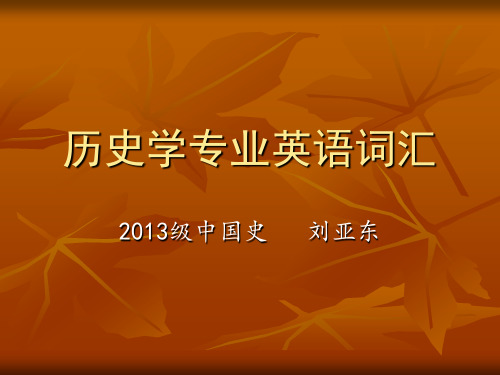
2013级中国史 刘亚东
1.Cathay [kæˈθe ] 华夏 e.g. And Cathay, which was produced under such manipulated factors, has played an important role in American and English literature.基于这些操控因素诞生的《华夏集》 的确对英美文学产生了重要影响。 2.pre-Qin philosophers [fɪ‘lɑsəfər] 先秦诸子 e.g. Chinese culture is one hundred schools of tho-ught in this division and among thepre-Qin philos- ophers constantly develop and enrich the up.中国文化就是在这些先秦诸子 学派的分合之中不断地发展和丰富起来的。
19.enlightment campaign启蒙运动. e.g. Since the Enlightment Campaign ,society and democracy have been linked to the idea of freedom and choice.从启 蒙运动开始,社会、民主就与自由、选择的概念联系 在一起。 20.the Northen Warlords[‘wɔr.lɔrd]北洋军阀. e.g. The ruling period of the Northern Warlords was the full developing stage of bureaucrat capital.北洋军阀统治时 期是官僚资本全面扩展的阶段。
英语词汇复习历史类
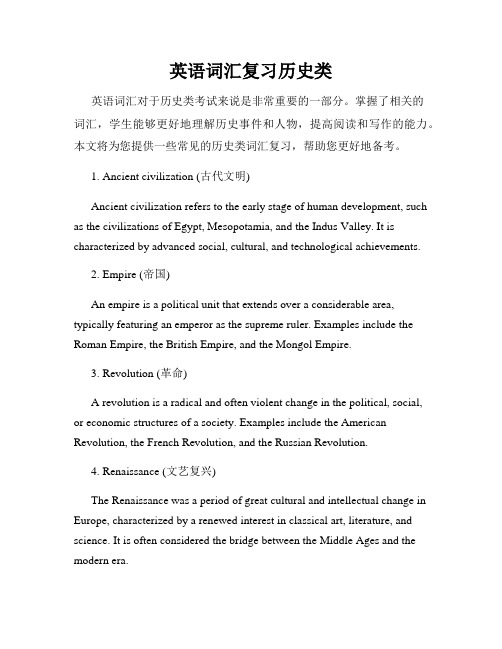
英语词汇复习历史类英语词汇对于历史类考试来说是非常重要的一部分。
掌握了相关的词汇,学生能够更好地理解历史事件和人物,提高阅读和写作的能力。
本文将为您提供一些常见的历史类词汇复习,帮助您更好地备考。
1. Ancient civilization (古代文明)Ancient civilization refers to the early stage of human development, such as the civilizations of Egypt, Mesopotamia, and the Indus Valley. It is characterized by advanced social, cultural, and technological achievements.2. Empire (帝国)An empire is a political unit that extends over a considerable area, typically featuring an emperor as the supreme ruler. Examples include the Roman Empire, the British Empire, and the Mongol Empire.3. Revolution (革命)A revolution is a radical and often violent change in the political, social,or economic structures of a society. Examples include the American Revolution, the French Revolution, and the Russian Revolution.4. Renaissance (文艺复兴)The Renaissance was a period of great cultural and intellectual change in Europe, characterized by a renewed interest in classical art, literature, and science. It is often considered the bridge between the Middle Ages and the modern era.5. Industrialization (工业化)Industrialization refers to the process of transforming an agrarian, rural society into one based on industry and manufacturing. It is often associated with the rise of factories, urbanization, and technological advancements.6. Colonialism (殖民主义)Colonialism is the policy or practice of claiming and dominating foreign lands and peoples. It was a significant feature of European expansion during the 15th to 20th centuries. Examples include the British Empire and the Scramble for Africa.7. Nationalism (民族主义)Nationalism is an ideology that emphasizes the interests, culture, and self-determination of a particular nation or group of people. It played a significant role in the breakup of empires and the formation of new nations in the 19th and 20th centuries.8. World War (世界大战)A world war is a conflict involving multiple nations on a global scale. The two most famous examples are World War I and World War II, which had a profound impact on the political and social landscape of the 20th century.9. Cold War (冷战)The Cold War was a state of geopolitical tension between the United States and the Soviet Union and their respective allies. It lasted from the late1940s to the early 1990s and was characterized by political, economic, and military competition.10. Civil rights movement (民权运动)The civil rights movement was a social and political movement advocating for equal rights and treatment for racial minorities, primarily in the United States. It peaked in the 1950s and 1960s and led to significant legislative and social changes.以上是一些常见的历史类英语词汇,通过对这些词汇的复习,您将能够更好地理解历史事件和人物,并在考试中取得更好的成绩。
英语课程中的历史文化专题词汇
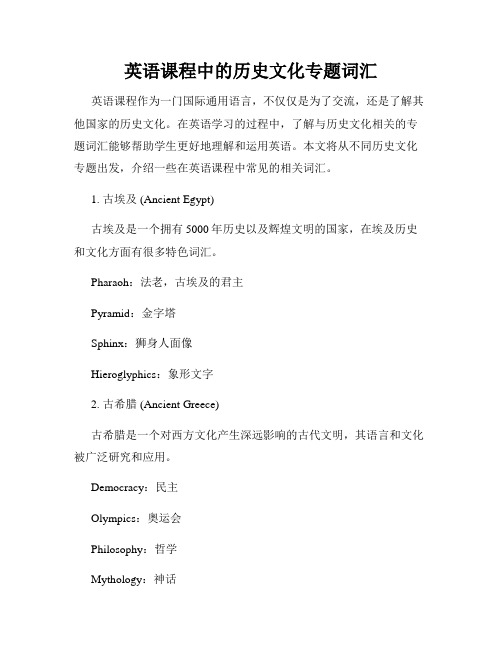
英语课程中的历史文化专题词汇英语课程作为一门国际通用语言,不仅仅是为了交流,还是了解其他国家的历史文化。
在英语学习的过程中,了解与历史文化相关的专题词汇能够帮助学生更好地理解和运用英语。
本文将从不同历史文化专题出发,介绍一些在英语课程中常见的相关词汇。
1. 古埃及 (Ancient Egypt)古埃及是一个拥有5000年历史以及辉煌文明的国家,在埃及历史和文化方面有很多特色词汇。
Pharaoh:法老,古埃及的君主Pyramid:金字塔Sphinx:狮身人面像Hieroglyphics:象形文字2. 古希腊 (Ancient Greece)古希腊是一个对西方文化产生深远影响的古代文明,其语言和文化被广泛研究和应用。
Democracy:民主Olympics:奥运会Philosophy:哲学Mythology:神话3. 古罗马 (Ancient Rome)古罗马是欧洲历史上最伟大的文明之一,其政治、法律、建筑和文化对世界产生了广泛的影响。
Colosseum:斗兽场Aqueduct:古罗马引水工程Gladiator:角斗士Roman Empire:罗马帝国4. 世界文明 (World Civilizations)世界各地的文明和历史都对英语课程中的专题词汇有所贡献。
Great Wall of China:长城Samurai:日本武士Maya Civilization:玛雅文明Hinduism:印度教5. 中世纪 (Medieval Times)中世纪是欧洲历史中一个重要的时期,影响着政治、文化和社会。
Knighthood:骑士精神Feudalism:封建主义Cathedral:大教堂Plague:黑死病6. 文艺复兴 (Renaissance)文艺复兴是欧洲历史上的一次重大变革,对文学、艺术和科学产生了深远影响。
Leonardo da Vinci:达芬奇Michelangelo:米开朗琪罗Humanism:人文主义Reformation:宗教改革总结:在英语课程中学习历史文化专题词汇,不仅拓宽了学生的知识面,还能增进对不同文化的理解和尊重。
历史考试专业词汇
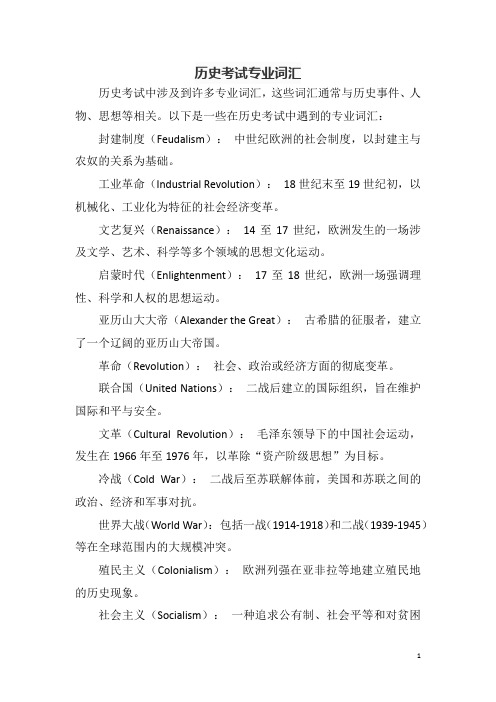
历史考试专业词汇历史考试中涉及到许多专业词汇,这些词汇通常与历史事件、人物、思想等相关。
以下是一些在历史考试中遇到的专业词汇:封建制度(Feudalism):中世纪欧洲的社会制度,以封建主与农奴的关系为基础。
工业革命(Industrial Revolution):18世纪末至19世纪初,以机械化、工业化为特征的社会经济变革。
文艺复兴(Renaissance):14至17世纪,欧洲发生的一场涉及文学、艺术、科学等多个领域的思想文化运动。
启蒙时代(Enlightenment):17至18世纪,欧洲一场强调理性、科学和人权的思想运动。
亚历山大大帝(Alexander the Great):古希腊的征服者,建立了一个辽阔的亚历山大帝国。
革命(Revolution):社会、政治或经济方面的彻底变革。
联合国(United Nations):二战后建立的国际组织,旨在维护国际和平与安全。
文革(Cultural Revolution):毛泽东领导下的中国社会运动,发生在1966年至1976年,以革除“资产阶级思想”为目标。
冷战(Cold War):二战后至苏联解体前,美国和苏联之间的政治、经济和军事对抗。
世界大战(World War):包括一战(1914-1918)和二战(1939-1945)等在全球范围内的大规模冲突。
殖民主义(Colonialism):欧洲列强在亚非拉等地建立殖民地的历史现象。
社会主义(Socialism):一种追求公有制、社会平等和对贫困的关切的政治经济体制。
这只是一个小小的范例,历史考试中的专业词汇会根据考试范围和内容有所不同。
建议参考具体的历史教材和考试大纲,以了解相关的专业词汇。
历史英语词汇大全帮助你理解和研究历史文化

历史英语词汇大全帮助你理解和研究历史文化在研究历史文化时,了解历史英语词汇是至关重要的。
这些词汇不仅能帮助我们理解历史事件和文化现象,还能揭示当时人们的思维方式和价值观。
本文将为您介绍一些常见的历史英语词汇,帮助您更好地理解和研究历史文化。
一、政治和社会制度1. Monarchy(君主制): 表示国家的最高权力由君主掌握的政治制度。
在君主制下,君主通常通过继承或选举的方式获得权力。
2. Democracy(民主制): 表示国家的最高权力由人民行使的政治制度。
民主制下,人民通过选举或公民投票的方式来决定国家的事务。
3. Revolution(革命): 指的是一种对现有政治或社会体制进行彻底改变的行动或运动。
革命往往伴随着大规模的社会动荡和政治权力的转移。
4. Empire(帝国): 指的是一个国家或地区通过征服其他国家或地区而形成的庞大政治实体。
帝国往往由一个皇帝或帝王统治。
5. Feudalism(封建制度): 是一种中世纪时期的社会和经济制度。
封建制度下,领主通过将土地授予农民的方式来换取其效忠和劳动。
二、战争和冲突1. Battle(战役): 指的是两个或多个军队之间的武装冲突。
战役往往是战争中的一个重要组成部分。
2. Treaty(条约): 是两个或多个国家之间达成的正式协议。
条约通常用于结束战争、确立边界或解决争端。
3. Siege(围攻): 是一种军事行动,指的是军队包围并困住敌方城市或堡垒,以迫使其放弃。
4. Alliance(联盟): 表示两个或多个国家或组织之间的正式合作关系。
联盟的目的可以是共同对抗其他威胁或实现共同利益。
5. Rebellion(叛乱): 指的是一群人对现有政权进行反抗或起义的行动。
叛乱往往由于政府压迫、不公正或不满所引起。
三、文化和艺术1. Renaissance(文艺复兴): 是欧洲历史上的一段时期,标志着艺术、文学和科学的繁荣和复兴。
文艺复兴时期对人类知识和文化的重要贡献至今仍受到赞誉。
历史英语词汇大全解读历史事件的关键词

历史英语词汇大全解读历史事件的关键词历史事件的理解和解释需要掌握丰富的英语词汇表。
本文将为您呈现历史英语词汇大全,通过解读这些关键词,帮助您更好地理解历史事件。
1. Dynasty(王朝)A series of rulers or leaders from the same family who rule a country for a long period of time. The word "dynasty" is often used to describe the ruling families in ancient China, such as the Han Dynasty or the Tang Dynasty.2. Revolution(革命)A sudden and dramatic change in political power or social structure. The word "revolution" is often associated with events such as the French Revolution or the Industrial Revolution.3. Empire(帝国)A group of countries or regions under the control of a powerful nation. The word "empire" is commonly used to describe historical empires such as the Roman Empire or the British Empire.4. Colonization(殖民)The process of establishing settlements or colonies in a new territory, often by a more powerful country. The word "colonization" is closely related to historical events like the colonization of the Americas by European powers.5. Independence(独立)The state of being free from the control or influence of others. The word "independence" is often used to describe significant events like the American Declaration of Independence or the Indian Independence Movement.6. Treaty(条约)A formal agreement between two or more countries or groups. The word "treaty" is frequently used to refer to historical agreements like the Treaty of Versailles or the Treaty of Tordesillas.7. Exploration(探险)The act of traveling to new or unfamiliar places in order to discover or learn about them. The word "exploration" is commonly associated with historical figures like Christopher Columbus or Zheng He.8. Dictatorship(独裁)A form of government where a single ruler or a small group possesses absolute power and authority. The word "dictatorship" is often used to describe regimes such as that of Adolf Hitler or Joseph Stalin.9. Industrialization(工业化)The process of developing industries and transforming an agrarian society into an industrial one. The word "industrialization" is closely linked to events like the Industrial Revolution or the Meiji Restoration in Japan.10. Renaissance(文艺复兴)A period of renewed interest and innovation in the arts, literature, and sciences. The word "renaissance" is commonly associated with the European Renaissance, a time marked by significant cultural and intellectual advancements.11. Rebellion(叛乱)An act of defiance or resistance against an established authority or government. The word "rebellion" is often used to describe historical events like the French Revolution or the American Civil War.12. Cold War(冷战)A state of political tension and military rivalry between the United States and the Soviet Union after World War II. The term "Cold War" is frequently used to describe the geopolitical climate from the late 1940s to the early 1990s.13. Abolition(废除)The act of officially ending or eliminating a system or practice, especially slavery. The word "abolition" is commonly associated with historical movements such as the abolition of slavery in the United States or the British abolitionist movement.14. Nationalism(民族主义)A strong feeling of pride, loyalty, and devotion to one's own nation or ethnic group. The word "nationalism" is often linked to historical events like the unification of Germany or struggles for independence in various countries.15. Holocaust(大屠杀)The systematic extermination of approximately six million Jews by the Nazis during World War II. The term "holocaust" is used specifically to refer to this tragic event in history.通过解读上述关键词,我们可以更加全面地了解历史事件和相关的历史背景。
(完整版)马克思主义历史学英语专业词汇

(完整版)马克思主义历史学英语专业词汇本文档旨在提供马克思主义历史学英语专业词汇的全面列表,以帮助研究者更好地理解和运用相关术语。
以下是一些常用的词汇及其解释:1. Historical Materialism (历史唯物主义): A Marxist theory that explains social and historical development based on the material conditions and class struggle.3. Class Struggle (阶级斗争): The conflict between different social classes, typically the bourgeoisie and proletariat, in which the working class seeks to overthrow the ruling class.4. Proletariat (无产阶级): The working class, who do not own the means of production and are therefore dependent on selling their labor for a wage.5. Bourgeoisie (资产阶级): The capitalist class, who own the means of production and exploit the labor of the proletariat.6. Superstructure (上层建筑): The cultural, political, and legal institutions that arise from the economic base, reflecting the dominant ideas and values of the ruling class.7. Base (经济基础): The economic foundation of society, including the means of production, relations of production, and social classes.8. Alienation (异化): The separation or estrangement of individuals from their true nature and the products of their labor, caused by the capitalist mode of production.9. Ideology (意识形态): A set of beliefs, values, and ideas that justify and support the interests of a particular social group or class.10. Historical Materialist Method (历史唯物主义方法): The approach used by Marxist historians to analyze historical events and processes, focusing on the material conditions and class struggle.此外,还有许多其他的马克思主义历史学英语专业词汇,这些词汇在研究和研究中起到重要的作用。
历史学英语词汇大全了解历史学理论与历史事件的专业术语
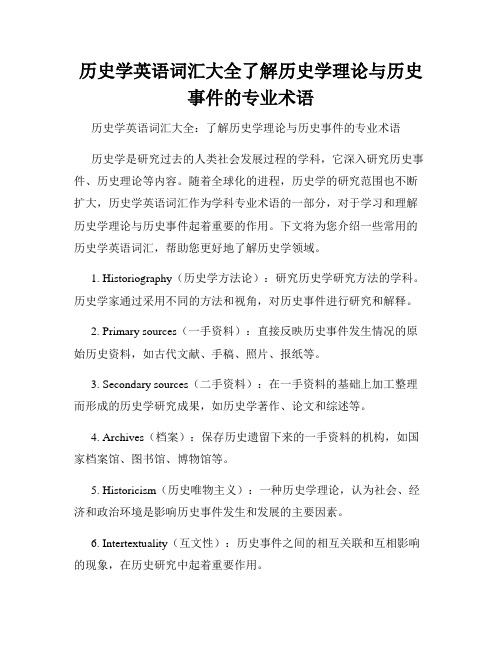
历史学英语词汇大全了解历史学理论与历史事件的专业术语历史学英语词汇大全:了解历史学理论与历史事件的专业术语历史学是研究过去的人类社会发展过程的学科,它深入研究历史事件、历史理论等内容。
随着全球化的进程,历史学的研究范围也不断扩大,历史学英语词汇作为学科专业术语的一部分,对于学习和理解历史学理论与历史事件起着重要的作用。
下文将为您介绍一些常用的历史学英语词汇,帮助您更好地了解历史学领域。
1. Historiography(历史学方法论):研究历史学研究方法的学科。
历史学家通过采用不同的方法和视角,对历史事件进行研究和解释。
2. Primary sources(一手资料):直接反映历史事件发生情况的原始历史资料,如古代文献、手稿、照片、报纸等。
3. Secondary sources(二手资料):在一手资料的基础上加工整理而形成的历史学研究成果,如历史学著作、论文和综述等。
4. Archives(档案):保存历史遗留下来的一手资料的机构,如国家档案馆、图书馆、博物馆等。
5. Historicism(历史唯物主义):一种历史学理论,认为社会、经济和政治环境是影响历史事件发生和发展的主要因素。
6. Intertextuality(互文性):历史事件之间的相互关联和互相影响的现象,在历史研究中起着重要作用。
7. Oral history(口述历史):通过口头传承的方式记录和研究历史事件,尤其是平民百姓的视角和经历。
8. Historically significant(具有历史意义的):指对于历史发展有重要影响或重大意义的事件、人物或现象。
9. Historical context(历史背景):指历史事件发生时的社会、政治、经济、文化等方面的条件和环境。
10. Historiographical debate(历史学术争论):历史学领域不同学者对于某一历史问题或事件的观点和解释存在分歧的辩论。
11. Primary research(一手研究):历史学研究者自行收集和分析一手资料来探索历史问题。
历史英语词汇大全了解历史事件历史人物和历史文化的英文英语词汇

历史英语词汇大全了解历史事件历史人物和历史文化的英文英语词汇History English Vocabulary: Explore Historical Events, Figures, and Culture in EnglishIntroduction:As an essential part of learning a language, vocabulary plays a crucial role in understanding historical events, figures, and culture. In this article, we will delve into a comprehensive compilation of English words and phrases related to history. By expanding our historical vocabulary, we can enhance our understanding of significant events, influential individuals, and the rich heritage of various cultures.1. Historical Events:1.1 World War I:- Trench warfare: A type of combat in which troops fought from trenches, characterized by its static nature.- Armistice: A formal agreement that halts fighting between nations.- Treaty of Versailles: The peace treaty signed in 1919, marking the end of World War I, which imposed significant conditions on Germany.- League of Nations: An international organization established in 1920 to maintain world peace and prevent future global conflicts.1.2 The Renaissance:- Humanism: An intellectual, cultural, and artistic movement emphasizing human potential and achievements.- Patronage: The financial support given to artists and scholars by wealthy individuals or organizations.- Perspective: A technique used in painting and drawing to create a realistic three-dimensional effect.- Scientific Revolution: The emergence of modern scientific methods and theories during the 16th and 17th centuries.1.3 Industrial Revolution:- Factory system: A method of manufacturing goods on a large scale using machinery within a centralized location.- Urbanization: The process of population migration leading to the growth of cities and towns.- Textile industry: The sector concerned with the production of fabrics and materials.- Steam engine: An engine that uses steam power to produce mechanical work and revolutionized transportation and manufacturing.2. Historical Figures:2.1 Political Leaders:- Winston Churchill: Former British Prime Minister known for his leadership during World War II.- Nelson Mandela: South Africa's first black president, anti-apartheid activist, and Nobel Peace Prize laureate.- Abraham Lincoln: 16th President of the United States who played a pivotal role in the abolition of slavery.- Napoleon Bonaparte: French military and political leader who rose to prominence during the French Revolution.2.2 Inventors and Scientists:- Thomas Edison: American inventor known for his contributions to the development of the electric light bulb.- Isaac Newton: English mathematician and physicist famous for his laws of motion and universal gravitation.- Marie Curie: Polish-born physicist and chemist who conducted pioneering research on radioactivity.- Leonardo da Vinci: Italian polymath known for his contributions to art, science, and engineering.3. Historical Culture:3.1 Art and Literature:- Impressionism: An artistic movement characterized by capturing fleeting impressions with emphasis on light and color.- Shakespearean sonnet: A 14-line poetic form introduced by William Shakespeare, known for its rhyming scheme.- Renaissance architecture: Architectural styles prominent during the European Renaissance, celebrated for their grandeur and symmetry.- Greek mythology: Ancient Greek stories and legends about gods, goddesses, and heroes, influencing art and literature.3.2 Traditions and Customs:- Tea ceremony: A Japanese cultural activity involving the ceremonial preparation and presentation of tea.- Carnival: A festive season celebrated in many countries, with parades, masks, and public celebrations.- Lunar New Year: The Chinese festival marking the beginning of the lunar calendar and celebrated with various traditions.- Day of the Dead: A Mexican holiday honoring deceased loved ones with ceremonies, feasts, and offerings.Conclusion:By familiarizing ourselves with a wide range of historical vocabulary in English, we can gain a deeper appreciation for global history, renowned figures, and diverse cultures. This comprehensive list serves as a valuable resource for expanding our knowledge and engaging in meaningful discussions about historical events, influential personalities, and cultural heritage. Let us embrace the power of language and explore history with a newfound perspective.。
- 1、下载文档前请自行甄别文档内容的完整性,平台不提供额外的编辑、内容补充、找答案等附加服务。
- 2、"仅部分预览"的文档,不可在线预览部分如存在完整性等问题,可反馈申请退款(可完整预览的文档不适用该条件!)。
- 3、如文档侵犯您的权益,请联系客服反馈,我们会尽快为您处理(人工客服工作时间:9:00-18:30)。
四、 半殖民地、半封建社会 (一)跨文化:Cross-culture
跨文化是跨越了不同国家与民族界线的文化,是不同民族、国家及群体之间 的文化差异,是通过越过体系以经历文化归属性的人与人之间的互动关系。
(二)租界:Concession
指两个国家议订租地或租界章程后,在其中一国的领土上为拥有行政自治 权和治外法权(领事裁判权)的另一国设立的合法的外国人居住地(土地国 有化)。在中国是指近代历史上帝国主义列强通过不平等条约强行在中国获 取的租借地的简称,多位于港口城市。
信仰主义 又称“僧侣主义”。一种贬低理性、宣扬盲目 信从、 以信仰代替知识或赋予信仰以一定意义的学 说。通常是神学家和 唯心主义者贬低科学、抬高信仰的一 种手段。其典型代表人物是 中世纪教父哲学家德尔图良。 信仰主义是一切怀疑论和不可知论 的最后归宿,是剥削 阶级愚弄劳动人民、维护反动统治的工具。 主要人物:德尔图良 思想:主张信仰和理性对立起来。
三、近代史 (一)优生学:Eugenics
优生起源于英国,意思为“健康遗传”。主要是研究如何用有效手段降低 胎儿缺陷发生率。现在优生已经成为一项国家政策,其主要的内容是控制先 天性疾病新生儿,以达到逐步改善和提高人群遗传素质的目的。目前可以通 过科技手段,来确保胎儿健康。目前,我国开展优生工作主要有如下几点: 禁止近亲结婚,进行遗传咨询,提倡适龄生育和产前诊断等。
玄学又称新道家是对《老子》、《庄子》和《周易》的研究和解说。产生 于魏晋。是魏晋时期的主要哲学思潮,是道家和儒家融合而出现的一种哲学、 文化思潮。
(二) 黄老之术:Daoism ['dauizəm]
道教,又称道家、黄老、老氏与玄门等,是中国土生土长的固有宗教。是中 国国人文化催生的,乃是中国人的根蒂,是东方科学智慧之源,是促进科技 发展的宗教以及全球最珍爱生命和尊重女性的宗教。深深扎根于中华传统文 化的沃土之中。据道经记载道教起于盘古开天辟地,元始立教说法。
指一种以男性为中心的权力。英语中Patriarchy可指男权、父权、父权体制、 家长制、家长统治。
(二)中世纪史 (一)骑士精神:chivalry
骑士精神和道德是上层社会的贵族文化精神,它是以个人身份的优越感为 基础的道德与人格精神的表现,但它也积淀着西欧民族远古尚武精神的某些 积极因素,代表了中世纪贵族的高尚品格。
(二)十字军东征:Crusade
伊斯兰世界称为法兰克人入侵;(1096年-1291年)是一系列在罗马天主 教教宗的准许下,由西欧的封建领主和骑士对穆斯林发动的披着“宗教”外 衣的侵略战争。 十字军主要是罗马天主教势力对穆斯林发动的侵略战争。 十字军以“捍卫宗教、解放圣地,抗击穆斯林侵略”为借口,同时也以政治、 社会与经济等目的,但是参加东征的各个集团各怀鬼胎,在1204年的第四次 十字军东征劫掠了东正教拜占庭首都君士坦丁堡。
历史专业英语词汇
姓 名:XXXX 学 号:XXXXXXXX
中、外词汇共二十个 历史专业英语词汇 中国史 原 始 社 会 奴 隶 社 会 十个 双 半 社 会 现 代 世 代 代 史 纪 史 史 史
中国史 一、原始社会 (一)信仰主义:fideism [faɪdɪɪz(ə)m]
四、现代史 (一) 建构主义:constructivism
建构主义(constructivism),其最早提出者可追溯至瑞士的皮亚杰 (J.Piaget)。他是认知发展领域最有影响的一位心理学家,他所创立的关于 儿童认知发展的学派被人们称为日内瓦学派。皮亚杰的理论充满唯物辩证法, 他坚持从内因和外因相互作用的观点来研究儿童的认知发展。他认为,儿童 是在与周围环境相互作用的过程中,逐步建构起关于外部世界的知识,从而 使自身认知结构得到发展。
(二)霸权主义:Hegemonism
是指一国凭借政治、军事和经济的优势,在全世界或个别地区破坏、控制 他国主权,谋求统治地位的政策。
(三)单边主义:unilateralism
谓单边主义是指举足轻重的特定大国,不考虑大多数国家和民众的愿望, 单独或带头退出或挑战已制订或商议好了的维护国际性、地区性、集体性和 平、发展、进步的规则和制度,
(二)神权政治:theocracy [θɪ'ɒkrəsɪ]
神权政治由宗教首领掌握国家政权的一种政治统治制度。盛行于奴隶社会 和封建社会。剥削阶级借助于宗教信仰来巩固其专制制度,神化国王,用王 权神授的思想和各种神化崇拜仪典来宣传麻痹人民,实行神权的君主专制。
三、封建社会 (一)玄学:metaphysics [metə'fɪzɪks]
(二)塔列朗:Talleyrand
夏尔·莫里斯·德塔列朗-佩里戈尔引(Charles Maurice de Talleyrand-Périgord,1754年2月2日-1838年5月17日)法 国资产阶级革命时期著名外交家,为法国资本主义革命的巩固做 出了极大贡献。从18世纪末到19世纪30年代,曾在连续6届法国 政府中,担任了外交部长、外交大臣,甚至总理大臣的职务。
并对全局或局部的和平、发展、进步有破坏性的影响和后果的行为与倾向。
(四)反犹主义:anti-Semitism
是针对犹太民族的种族主义行为。在很多国家,反犹主义是一种法律界定 的犯罪行为。 反犹主义到底起源于何时,学术界有不同的看法,但通常认为 公元一世纪古罗马文人笔下的犹太人形象已经具有某些后代反犹主义者所描 述的犹太特征。
五、中华人民共和国时期 (一)农业集体化(agricultural collectivization [kə,lɛktɪvaɪ'zeʃən]
是通过合作社把个体的小农经济改造成为社会主义集体经济的过程,引导农 民走向集体经济 。
(二)纠偏:rectification 世界史 一、古代史 (一)父权制:patriarchy (二)僭主政治:tyranny
指以非法手段取得政权者(僭主)建立的独裁统治。公元前7世纪—公元前 6世纪在希腊的科林斯、阿哥斯、麦加拉、西基昂、雅典等城邦,都出现过僭 主政治。“僭主”一词起初并无贬义,在诗人(如品达)的作品中有时亦称 “僭主”为“王者”。早期希腊的僭主政治一般对于肃清氏族制度的残余曾 起积极作用,但在激荡的政治斗争潮流中却往往不能久存,迄公元前5世纪--公元前4世纪,“僭主”渐含贬意,如对西西里叙拉古僭主狄奥尼修父子即 是。
(二)华夏:Cathay
古语、诗歌用语 (中国)
[kæ'θei]
二、奴隶社会 (一)先秦诸子:pre-Qin philosophers
“先秦”指秦始皇焚书之前的一段时间,约为东周 春秋战国之世,我 国主要的学术思想如儒、墨、道、法等大家,都起源于这个时期。子, 是当时对人的尊称,即先生的意思,后来称全心全意的著作也叫“子”。 周王室东迁以后,学术重心由王官逐渐移向民间,自老子、孔子以 后,一时大思想家辈出,如墨子、孟子、庄子、荀子、韩非子等,皆能 著书立说,而成一家之言,后世因称这些思想家为“先秦诸子”。先秦 诸子的学说在中国思想史上占有崇高地位,后世思想学派莫不渊源于此, 诸子著作是了解中国古代社会政治、经济、文化的宝贵资料。详情请参 见“老子”、“孔子”“庄子”、“墨子”、“孟子”、“荀子”各条。
